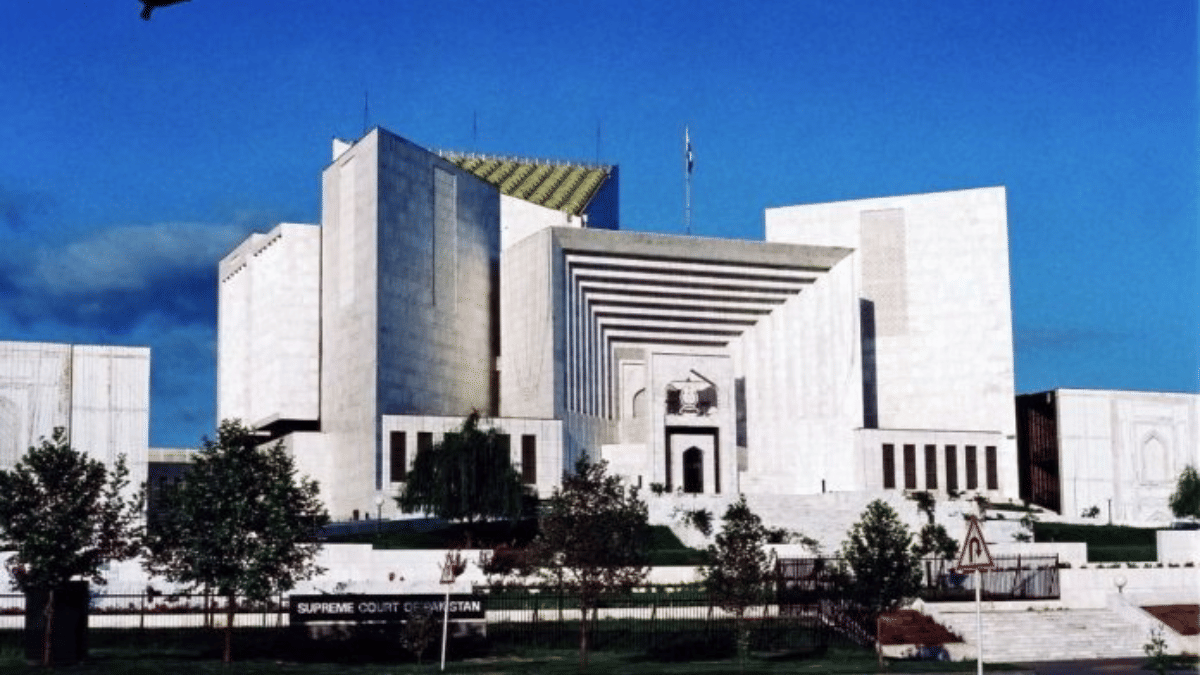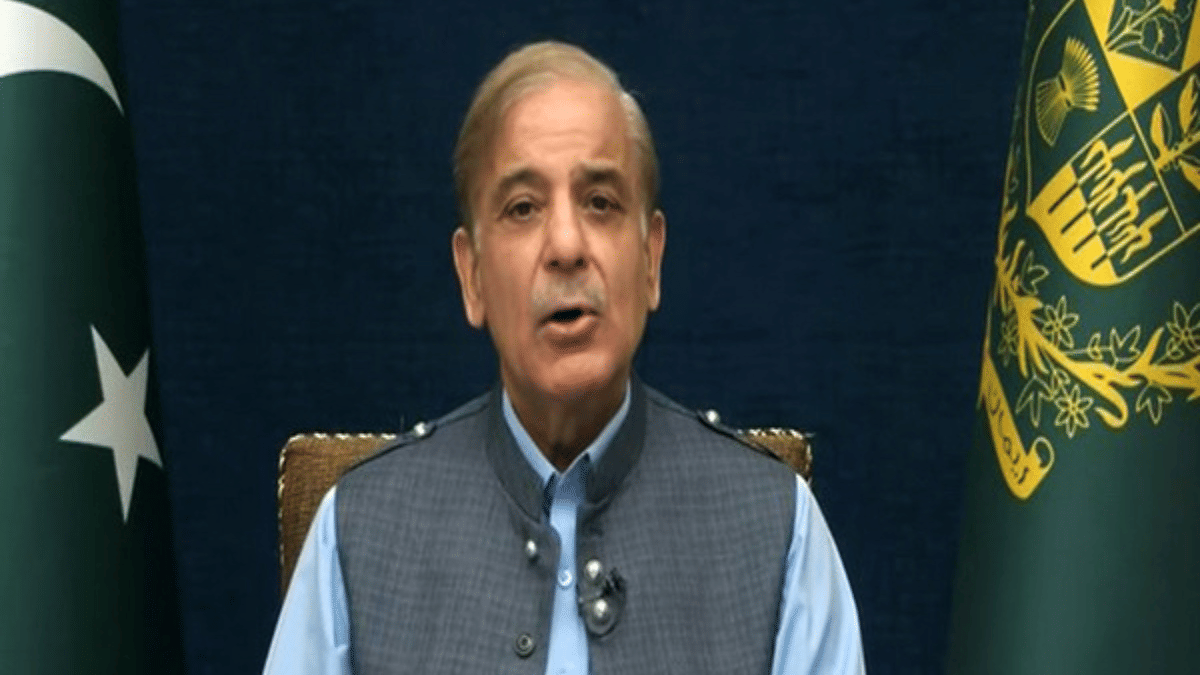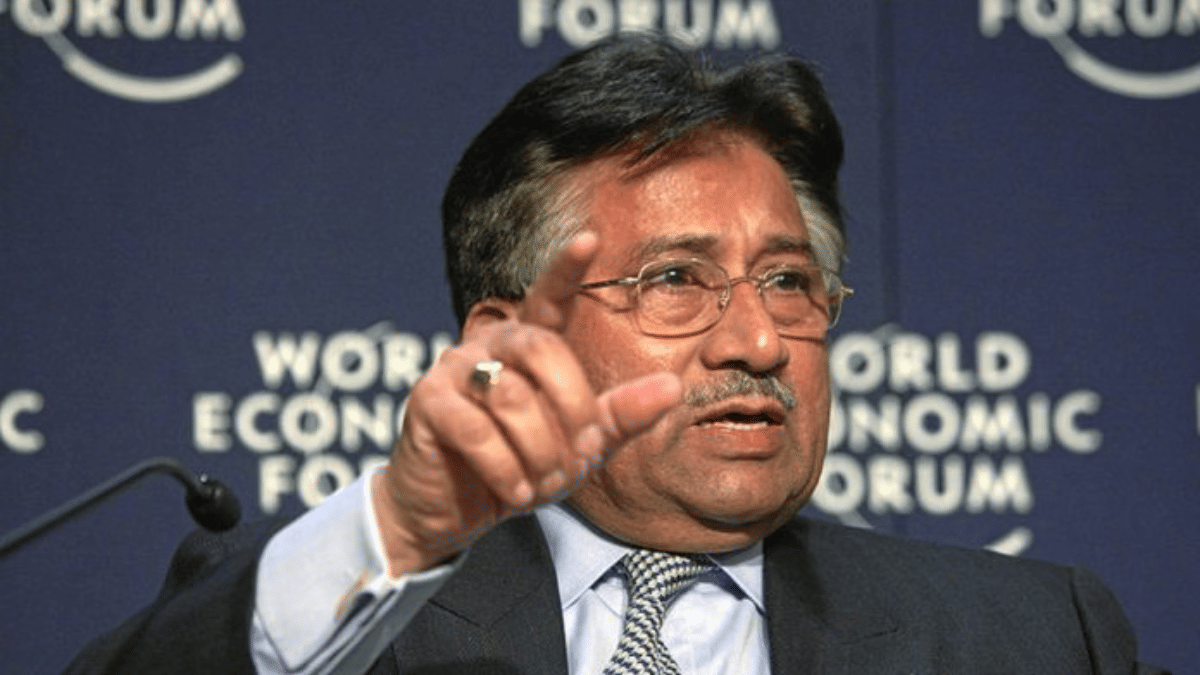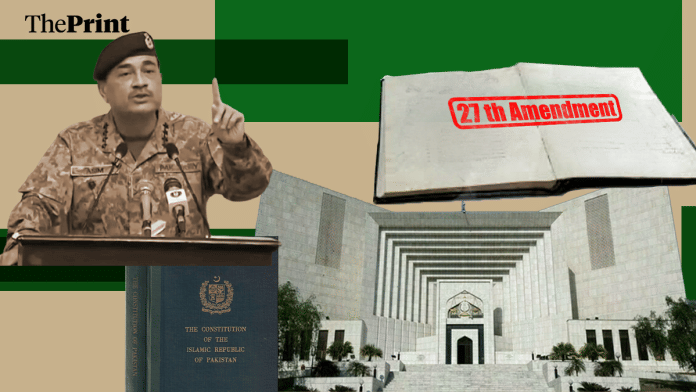Pakistan’s national assembly has passed the 27th Constitutional Amendment Bill, which makes Asim Munir Field Marshal for life, the chief of all defence forces, including Pakistan Navy & Air Force, and gives him President-like immunity from prosecution. In this edition of ThePrint CutTheClutter, published on 12 November 2025, Editor-in-Chief Shekhar Gupta looks at the changes,and the significance of the 27th Amendment, and previous instances when Pakistan’s Constitution has been amended.
Here is the full transcript.
In Pakistan, they have once again brutalised, obliterated or simply rewritten their constitution. In the process, Asim Munir has become field marshal for life, and not just the chief of the army but also the air force and the navy. He’s also gifted himself lifelong immunity from any charges or prosecution.
At the same time, under the new order brought in by the 27th amendment just rammed through the Pakistani National Assembly and Senate, the Supreme Court has been eviscerated, high courts emasculated and the judiciary made subordinate to the executive. Which, in turn, is hopelessly subservient to the army.
How, we will explain to you as we go along in Episode 1755 of Cut The Clutter. So, do stay with me.
To understand the dramatic turn, now we need to appreciate how we got here. Constitutions in Pakistan have had about as much longevity as its prime ministers. Or, we can say both have had about equal half-life. Flickering, fading, disappearing. Sometimes physically so, starting with the first prime ministers, assassinated in 1953.
The fact is, Pakistan has had many constitutions, but they got their first only in 1956. After its birth in 1947, Pakistan took 10 years to give itself its first constitution. It barely survived two years.
It took them 10 years, four governor-generals, four prime ministers, and two constituent assemblies to get themselves the first constitution in 1956. Fourth Governor General Iskandar Mirza, by the way, was also the fourth prime minister, simply transitioning from one role to the other—if briefly.
In the subcontinent’s history, he’d also be remembered as the great grandson of Mir Jafar of the Battle of Plassey infamy.
This Constitution was abrogated in 1958 when martial law was imposed by Iskander Mirza, who brought in General Ayub to administer it. In the course of time or in the course of very short time, the general had his prime minister fired and became a dictator as the chief martial law administrator should be. In the course of a very short time, he promoted himself to field marshal. Of course, he abrogated his country’s first constitution. It lived barely two years.
Asim Munir, therefore, is the second field marshal in Pakistan’s history. He might have had one regret, however. That, his power over the government is de facto, not de jure. That he has now fixed by mutilating his republic’s constitution.
Ayub brought in the second constitution in 1962 that brought in a curiosity that he described as guided democracy, and abolished the prime ministership. Then in 1969, public anger grew as the reality of the failed 1965 war became apparent and the economy declined.
In 1969, Ayub scooted. His 1962 constitution went with him. Yahya Khan came in as the new dictator with this new martial law, and didn’t need any constitution. We know how he went out in defeat and disgrace in December 1971.
In 1973, Zulfikar Ali Bhutto brought in a constitution. It was a fairly proper constitution of the Islamic Republic of Pakistan. That constitution, in a way, still endures, except that every few years a new power rises in Pakistan to alter it to suit its needs.
Almost always, in fact always, a military power that brutalises that constitution and brutalises it to the extent that it becomes unrecognisable. So what has happened right now? The 27th Amendment to the Pakistani Constitution of 1973 has been steamrolled through Parliament and the Senate. It required two-thirds majority. But you know what? This is a country that’s owned by the Army, who needs to count.
Because, while there is a supposedly elected government, it’s hardly an elected government. It’s an appointed government. And it cannot say anything to the Army. Field Marshal Asim Munir has now become as powerful as Pervez Musharraf might have been as a dictator. Maybe even more.
Further, learning from the fate of Musharraf, who faced trial and conviction for treason after losing power, Munir is giving himself an insurance. Insurance like this does not always work, we know, as black Swan events can come in anybody’s life, including a field marshal’s. But see what he’s doing. In summary, what does this 27th amendment do?. First of all, it formally makes the army, the army, not the armed forces, the army, the preeminent power in Pakistan.
How does it work? First of all, it says the army chief now will automatically have a second title of chief of Defense Forces, which means the army also becomes the boss of Air Force and the Navy. So the Air Force and the Navy become subservient to the Army. Permanently and constitutionally.
I do not believe that any major country, that too a nuclear-weapon country with large armed forces, has this clarity, you can say, or has this clutter, depending on how you see it. We’ll see. But now with this amendment, the army chief, by constitution, will be the chief of the defence forces.
So the Chief of Army Staff-cum-CDF. The chief of Defense Forces doesn’t always have to be field marshal. However, once somebody becomes field marshal, he serves for life. Field Marshal Asim Munir will be field marshal for life. For life, which means that a field marshal now will have his rank, his pay and allowances, his privileges and uniform for life.

So even if he lives till 110 years, he can still wear his fancy uniform and carry the rank and the baton. So, field marshal will always be there. Even more importantly, the field marshal now will have the same constitutional protection from either prosecution or any charges etc. as the president of Pakistan under article 248 of the Pakistani Constitution, whereby, like the president, the field marshal cannot be prosecuted for anything he might have done wrong. In America, you find outgoing presidents give pardons to people whom they think might be targeted by the newcomer, or in case of Trump, he can also give preemptive pardons, and he can also spread them around.
Also Read: Pakistan’s constitutional amendment ‘can inspire Kim Jong Un,’ people say. Dark days ahead
Immunity for life
It’s a bit more fun in Pakistan now. The constitutional immunity for the president ends once the incumbent goes out of office. If the same protection under article 248 applies “mutatis mutandis” to the field marshal as the 27th amendment says, how come he gets immunity for life? Because, remember, the same amendment says that the field marshal serves for life. Such things might have happened under some storied African dictators, like, say Idi Amin. But never in a country as large and significant as Pakistan.
The 27th amendment specifically rewrites Article 243 of Pakistani Constitution, which defines the relations between the civilian authority and the armed forces in terms of who controls whom and how. This has been gutted. This army chief will now be the commander of all forces. That means the navy and the air force as well. Then with this, the office of the chairman, Joint Chiefs of Staff Committee will be abolished.

This office, incidentally, came up as a consequence of the 1971 defeat of the Pakistani armed forces. Zulfiqar Ali Bhutto set up a commission under a Supreme Court judge. It was called the Justice Hamoodur Rahman Commission.
That commission made many recommendations, and one was that there should be a mechanism whereby the three forces can work closer together, or what is usually called jointmanship. Because there were many stories about 1971 war, for example, when the Indian Navy and the Indian Air Force both were raining hell over Karachi and continuously for more thana couple of days with no challenge from Pakistan Air Force, there was a story of Pakistan Navy chief calling his PAF counterpart to ask what the hell is happening? ‘You are not here. I am in trouble’.
The story, may be apocryphal or spiced up, is that the PAF chief said something like, ‘calm down, old boy. This is war. Such things happen’.
Nevertheless, Justice Hamoodur Rahman Commission’s recommendation was that there should be a Joint Chiefs of Staff Committee. That was to have a chairman who would come from any of the three forces by rotation, as indeed has been the tradition in India.
In Pakistan, it did not quite work out that way as 15 of the 18 chairmen have been army generals. Two navy admirals and one air marshal found their way in at some points. These chairmen JCSC from the army include General Sahir Shamshad Mirza, whose speech we had quoted from just the other day. He’s the one who said that in India, the problem is that politics has become militarised, and the military has become politicised, etc. and also said that India has conventional superiority, which makes Pakistan’s nuclear weapons that much more important.

That was a very provocative statement. He finishes his term on November 27th. That is the date on which this 27th amendment dissolves the office of the chairman, Joint Chief of Staff Committee. That office is history. That institution is not needed because everything is now sitting under the Chief of Army Staff, who is also the chief of defense forces. That one man takes care of jointmanship, I suppose.
A cabinet meeting was held on November 7 when Shehbaz Sharif, the prime minister, and also Asim Munir were in Baku for Azerbaijan’s national day celebrations. Sharif is more material here because it is his cabinet. He was in Baku, so he presided over the cabinet meeting from Baku by video conferencing. And he approved this epochal amendment. And then this was moved immediately to both houses.
You might ask with good reason why such crashing hurry for Sharif to hold his cabinet meeting on video conferencing. Couldn’t he have done so when he returned a couple of days later? It is Munir who was rushed. His three-year term ends this November.
While, with the 26th Amendment carried out in September 2024, the chief’s tenure could be extended to five years, it still needed a two-year extension by the president. Munir didn’t want the extension because that also would’ve made his tenure finite. He wants to end all argument, all tensions, speculation, intrigue and rona-dhona over his position by cementing it for life.
You can laugh if you so wish, but in fairness we must mention that the amendment also says that if somebody is given the rank of marshal of the Air Force or admiral of the fleet, the five-star equivalents in the other two forces, they will also have the same privileges. And why this lifelong service and privileges? Because, the amendment says, these will be national heroes. Show me another republic with a constitution that also defines living national heroes and their privileges—the rank, pay, pomp and show for the rest of their lives, and also immunity from any charges for their lives.
Now, what will they do if they retire? When they retire, and say in the course time, a new field marshal, a new chief comes in because, after all, somebody can’t be chief forever. The experience of Pakistan has been that whenever the chief becomes the president or takes political power the ambition of the next in line doesn’t get extinguished. They start pushing upwards. General Mirza Aslam Beg troubled Zia and Musharraf had trouble with Ashfaq Parvez Kayani.
This amendment doesn’t stop here. This also establishes a national strategic command that will control all the nuclear weapons of Pakistan. Obviously, this national strategic command will need a commander. That commander will be will be chosen, obviously, by the army chief and commander of defense forces, supposdely in consultation consultation with the prime minister. For clarity, the commander of strategic forces, National Strategic Command, also will come from the Army can never be from the navy and air force. There isn’t full clarity yet, but it seems that the current Nuclear Command Authority, which also has strong civilian representation, will now be abolished. This means the Pakistani army will have total and final control of its nuclear assets. The prime minister and cabinet are reduced to court jesters.
Now, besides rewriting civil-defence relations, what else has been amended?
These military changes are more material for us in India, but for people of Pakistan, maybe these don’t matter so much because they are they are used to their army having so much power. The more material change for them is that radically changes their executive-judiciary relations.






